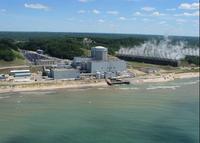-
Missouri looking for ways to fund infrastructure repairs
As is the case in other states, Missouri faces “a huge backlog of repair and maintenance needs” in its infrastructure, in the words of a state lawmaker. Lawmakers debate bond issue, increase in state sales tax, and other measures to fund the necessary repairs.
-
-
Michigan’s Palisades nuclear power plant has significant safety issues

A recent report by the Union of Concerned Scientists (UCS) lists the Palisades Nuclear Power Plant in Michigan as one of three plants in the United States with significant safety episodes or “near-misses” over the last three years.
-
-
Making future sea-level predictions more accurate
Sea-level rise is a major issue facing those in charge of infrastructure protection in coastal communities. New research into radiocarbon dates of tiny fossilized marine animals found in Antarctica’s seabed sediments offers new clues about the recent rapid ice loss from the West Antarctic Ice Sheet and helps scientists make better predictions about future sea-level rise.
-
-
Grid-scale batteries for storing renewable energy have large carbon footprint
Most of the electricity produced in the United States comes from coal- and natural gas-fired power plants. Only about 3 percent is generated from wind, solar, hydroelectric, and other renewable sources. A key problem is that the U.S. electrical grid has virtually no storage capacity, so grid operators cannot stockpile surplus clean energy and deliver it at night, or when the wind is not blowing. Stanford scientists have developed a novel way to calculate the energetic cost of building large batteries and other storage technologies for the electrical grid. The found that the fossil fuel required to build these technologies could negate some of the environmental benefits of installing new solar and wind farms.
-
-
Napolitano testifies on cybersecurity executive order
Two Senate panels questioned DHS Secretary Janet Napolitano yesterday at a hearing on President Obama’s cybersecurity executive order and what issues need to be addressed in cyber legislation. “We simply cannot afford to wait any longer to adequately protect ourselves,” Said Senator Jay Rockefeller (D-West Virginia), chairman of the Senate Commerce Committee.
-
-
Tech companies, telecoms clash over cybersecurity executive order
Last August a cybersecurity bill died in Congress amid partisan bickering. On 12 February this year, President Obama packed many of that bill’s elements into a cybersecurity executive order. To make the order more acceptable to some of its congressional and industry critics, the president introduced an exemption which would take large technology companies off the list of companies subject to the new cybersecurity standards. This exemption placated some of the original cybersecurity bill’s critics, but angered others, chief among them telecommunication companies.
-
-
Precious metal recovery technique ideal for rare Earth elements purification
Researchers have come up with a new approach to make the recovery of high value precious metals faster and more economically viable. The new technique could be ideal for the purification of rare earth elements, which are vital commodities for ‘green’ technologies such as hybrid cars and novel batteries.
-
-
Coal and U.S electric power generation

Coal is an important fuel source in the United States today. Responsible for approximately 39 percent of the country’s electrical generation, coal is vital to the day-to-day operation of people’s lives. The United States is rich in coal deposits, with large resources. One of the most important and largest of those deposits is found in the Powder River Basin (PRB) of Wyoming and Montana, which, in 2012, produced more than 42 percent of the nation’s coal.
-
-
U.S. nuclear industry resists stricter, post-Fukushima safety measures
Since the March 2011 Fukushima disaster, members of the Nuclear Regulatory Commission (NRC) have been debating whether or not to impose even stricter safety measures on the thirty-one U.S. boiling water reactors (BWRs). Utility companies have been fighting any new safety regulations, arguing that the security measures they have are more than enough.
-
-
New source for rare earth elements: discarded consumer products
In a new twist on the state’s mining history, a group of Idaho scientists will soon be crushing consumer electronics rather than rocks in a quest to recover precious materials. Two national labs in the state will apply expertise gained in recycling fissionable material from nuclear fuel to separate rare earth metals and other critical materials from crushed consumer products.
-
-
Using plants for herbal defluoridation of drinking water

A filtration system based on a medicinal herb can quickly and easily remove “fluoride” from drinking water, say researchers in India. The technology uses parts of the plant Tridax procumbens as a biocarbon filter for the ion.
-
-
Does the U.S. face a nuclear power exit?
In a 2012 report, the Obama administration announced that it was “jumpstarting” the U.S. nuclear industry. Because of the industry’s history of problems, cost overruns, and construction delays, financial markets have been wary of backing new nuclear construction for decades. The supposed “nuclear renaissance” proclaimed in the first decade of this century never materialized. Then came Fukushima, a disaster that prompted countries around the world to ask: Should nuclear power be part of the energy future?
-
-
Norfolk, Virginia, tries to cope with sea-level rise
Norfolk, Virginia, is home to the largest U.S. naval base in the country, and the second biggest commercial port on the U.S. Atlantic coast. Floods are an ever-present problem, a problem which has become worse in recent decades. The relative sea level around Norfolk has risen 14.5 inches (.37 meter) since 1930, when the low-lying downtown area routinely flooded. The frequency of storms-induced surges has increased as well.
-
-
The impact of sea-level rise on coastal military installations
The Pentagon says that climate-related effects are already being observed at Department of Defense (DoD) installations in every region of the United States and its coastal waters. The effects of climate change will adversely impact military readiness and DoD natural and built infrastructure unless these risks are considered in DoD decisions. A new white paper developed by the Pentagon’s Strategic Environmental Research and Development Program (SERDP) identifies key climate-related policy questions that need to be addressed.
-
-
Volcanic aerosols, not pollutants, slowed recent Earth warming
Researchers looking for clues about why Earth did not warm as much as scientists expected between 2000 and 2010 now thinks the culprits are hiding in plain sight — dozens of volcanoes spewing sulfur dioxide.
-
More headlines
The long view
Water Wars: A Historic Agreement Between Mexico and US Is Ramping Up Border Tension
As climate change drives rising temperatures and changes in rainfall, Mexico and the US are in the middle of a conflict over water, putting an additional strain on their relationship. Partly due to constant droughts, Mexico has struggled to maintain its water deliveries for much of the last 25 years, deliveries to which it is obligated by a 1944 water-sharing agreement between the two countries.
Trump Is Fast-Tracking New Coal Mines — Even When They Don’t Make Economic Sense
In Appalachian Tennessee, mines shut down and couldn’t pay their debts. Now a new one is opening under the guise of an “energy emergency.”
Smaller Nuclear Reactors Spark Renewed Interest in a Once-Shunned Energy Source
In the past two years, half the states have taken action to promote nuclear power, from creating nuclear task forces to integrating nuclear into long-term energy plans.
Keeping the Lights on with Nuclear Waste: Radiochemistry Transforms Nuclear Waste into Strategic Materials
How UNLV radiochemistry is pioneering the future of energy in the Southwest by salvaging strategic materials from nuclear dumps –and making it safe.
Model Predicts Long-Term Effects of Nuclear Waste on Underground Disposal Systems
The simulations matched results from an underground lab experiment in Switzerland, suggesting modeling could be used to validate the safety of nuclear disposal sites.
